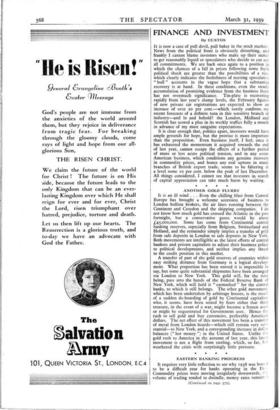ANOTHER GOLD FLURRY
It is an ill wind . . . Even the chilling blast from Central Europe has brought a welcome accession of business to London bullion brokers, the air lines running between the Continent and Croydon and the shipping companies. I do not know how much gold has crossed the Atlantic in the past fortnight, but a conservative guess would be about £45,000,000. Some has come from Continental central banking reserves, especially from Belgium, Switzerland and Holland, and the remainder simply implies a transfer of geld from safe deposits in London to safe deposits in New York. Both movements are intelligible as the latest efforts of central bankers and private capitalists to adjust their business policy to political developments, and neither implies any threat to the credit position in this market.
A transfer of part of the gold reserves of countries within easy striking distance from Germany is a logical develop- ment. What proportion has been moved it is impossible to say, but some quite substantial shipments have been arranged via London to New York. This gold will, for the time being, pass into the hands of the Federal Reserve Bank of New York, which will hold it " earmarked " for the central banks, to which it still belongs. The other gold movement. which has been undertaken by arbitrage houses, is the resu' of a sudden de-hoarding of gold by Continental capitalist, who, it seems, have been seized by fears either that their treasure, in the event of a war, might become a frozen asset or might be sequestrated for Government uses. Hence the rush to sell gold and buy currencies, preferably American dollars. The net effect of this movement has been a transfer of metal from London hoards—which still remain very sub- stantial—to New York, and a corresponding increase in dollar balances (" hot money ") in the United States. Unlike the gold rush to America in the autumn of last year, this latest movement is not a flight from sterling, which, so far, has weathered the crisis with surprisingly little pressure.


































































 Previous page
Previous page